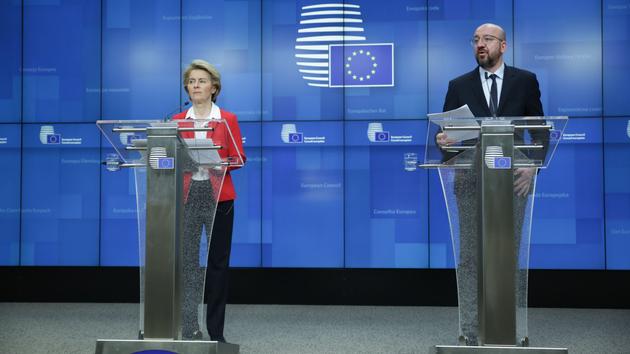Correspondent in Brussels
How can the spread of the coronavirus be limited without curbing the movement of goods within the Union and preventing EU nationals who wish to return to their country? It is on the question of the articulation between the external and internal borders of the EU that were studied Tuesday, at the end of the afternoon, the leaders of the Twenty-Seven gathered by videoconference for a summit devoted to the epidemic.
We walk together in tight rows, sticking together
Charles Michel, President of the European CouncilAfter several weeks of decisions taken without consultation, the Europeans wanted to demonstrate that they were able to come together. This was welcomed by the President of the European Council, Charles Michel, after the camera. " We are advancing together in close ranks, sticking together, " he said, while the President of the Commission, Ursula von der Leyen, seemed delighted to see the Twenty-Seven take up his proposals. Starting with the closure of the Union's external borders, pushed by Emmanuel Macron.
Read also: Coronavirus: can we close the borders despite the Schengen agreements?
These closings were to affect a total of 32 countries, namely the Schengen countries but also the five EU non-Schengen states as well as the United Kingdom. A historic choice. “Portugal wanted fewer restrictions in order to keep their strong ties to Brazil, and Poland wanted more restrictions. But, overall, everyone is going in the same direction, “ confided shortly before the meeting a European diplomat. The United Kingdom has however indicated that it is not prepared to take the plunge, mechanically dragging Ireland in its wake. By Tuesday evening, several countries had already closed: France, Germany, Spain, Sweden and Latvia. " I think that by the end of the week, they will have closed their borders, " wants to believe a diplomat.
As border management is a national competence, each State must take its own measures. Besides, Paris did not wait for the meeting of the Twenty-Seven. As of Monday evening, Emmanuel Macron announced the locking of his external borders for the next day, at 12 noon. France has also closed its borders with Italy, Germany, Spain and Switzerland. "Only cross-border workers, nationals of the countries concerned and goods are allowed to pass," it said to the Ministry of the Interior, where it was said that these were "coordinated decisions" and where we do not rule out locking the borders with neighboring "other countries" either .
Read also: Coronavirus: countries that close their borders to the French
When it comes to unilateral decisions, strict controls or closings at internal borders are very problematic. Lines of trucks are forming in Europe. Some 80 kilometers of traffic jams were reported on Monday at the Brenner Pass, on the border between Austria and Italy. There is also a lot of waiting at the borders between Germany and Poland, between Sweden and Denmark. As a result, there are risks for the supply of medical equipment and foodstuffs and the impossibility for nationals to return home. This is the case of certain Baltics, prevented from crossing Poland to join their country. The Twenty-Seven agreed on Tuesday on dedicated lanes for trucks and on the need to let European nationals pass by to return to their country. As for Europeans who are currently outside the EU, flights will be organized by the bloc for their repatriation.

